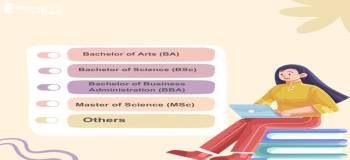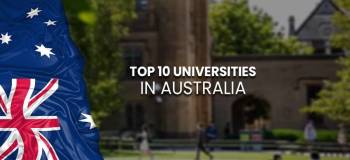Need personalized assistance? Your solution starts here!


Author Name - Education Vibes, Apr, 20 2023
779
International students from non-native English-speaking countries who want to study at a university in abroad must take an English language proficiency exam. [TOEFL or IELTS]. Both have a high level of credibility and acceptance by institutions that want to evaluate a person's English. They both assess reading, writing, speaking, and listening abilities.
TOEFL stands for Test of English as a Foreign Language, and it is an English language competence test developed by the ETS company in the United States (Education Test Service).
The International English Language Testing System is abbreviated as IELTS. IDP Australia, The British Council, and Cambridge Examinations own and operate the test.
Although the goal of these tests is the same, they vary in a number of ways. Thus, if you're not sure which to take, read our guide to grasp the differences between IELTS and TOEFL and select the best one for you.
Structure of the IELTS and TOEFL Exams
The table below compares the differences between all portions of both exams:
|
Section |
TOEFL |
IELTS |
|
Reading |
|
|
|
Listening |
|
|
|
Writing |
|
|
|
Speaking |
|
|
Students can find out their TOEFL score 6–10 days after taking the test. The IELTS test results are available online a week after the test or in paper form 13 days after the test. If you're still perplexed, try reading IELTS vs. TOEFL.

Author Name - Education Vibes, May, 13 2023
343
You might have a question whether you can study abroad without IELTS. Actually, studying in a foreign college or university comes with a long list of prerequisites that requires to be fulfilled before you take admission. A common essential requirement is language proficiency test, such as IELTS and/or TOEFL scores. These tests are mandatory or many native English speaking countries to study there. But the good news is – there are many universities all around the world that allow international students to study sans IELTS and/or TOEFL scores.
Universities all around the world, especially native English speaking countries require IELTS/TOEFL score to test students’ proficiency in English language, that’s all. Nothing more, nothing less! These two standard tests scores come under the common European framework. These are nothing but standard tests that measure the students’ dexterity with English language, like reading, speaking, and writing English.
Therefore, attaining a desirable score is mandatory for some universities in the Canada, UK, and USA, and many other countries. These test scores are judged the proficiency of non-native English speakers. Even though, these tests are major criteria for admission, but there are many universities all across the globe that grant admissions, and let international students study abroad sans IELTS or TOEFL score. List is some of the great universities in the world grant admissions to international students without IELTS/TOEFL.
University of Siegen, Germany
American Business School, France
Polytechnic University of Milan, Italy
Ghent University, Belgium
Uppsala University, Sweden
University of Oslo, Norway
University of Bergen, Norway
Riga Technical University, Latvia
University of Amsterdam, Netherlands
Though this is just a small list, there are hundreds of thousands of universities in the world that grant students to study over there without IELT or TOEFL score. You can study in Australia and Ireland without these two English proficiency tests. You just need to have basic eligibilities, like secondary, senior secondary or intermediate scores, identity proof, citizen of your own country and other things to apply to study in a university in Australia or Ireland.
In Conclusion - Needless to mention, for many international students, qualifying IELTS/TOEFL exam is a big challenge and obstacle in their career journey. Many international students get descent scores in these exams, but most of the times it required more to get admission in many universities in the UK, USA, Australia, Canada or France, to name a few.
But thankfully, not all universities in the world stick to these criteria. These universities, and some of the universities that we have mentioned here allow other options, such as alternative language proficiency tests as well to take admission.
Apart from the list of without IELTS or TOEFL countries, international students can also go to UK, Canada, Germany, Australia, New Zealand etc. to pursue their dream degrees. They only need to read the process of admission carefully and other eligibility criteria to ensure they are prepared for.
For further guidance in your study abroad journey, feel free to get in touch with Education vibes. Your trusted partner for study abroad!

Author Name - Education Vibes, May, 27 2023
620
These days, English is by far the most commonly used language all across the world. It is the most spoken language in the world, with a staggering 1.5 billion native speakers. In the current day and age, English is spoken in practically every part of the globe, including non-native nations. Yet, there are certain countries that are dominated by the English language, such as the United States of America, Australia, the United Kingdom, New Zealand, Canada, Ireland, and others.
Various EP exams are available, but the two most popular are IELTS and PTE. In this essay, we shall compare and contrast IELTS and PTE.
IELTS - The International English Language Testing System is often referred to by its acronym, IELTS. The purpose of this exam is to measure English competency in native English-speaking nations at a time of complex evaluation and scenario, whether one chooses to reside or study in the country. The British Council, IDP: IELTS Australia, and Cambridge English are all co-owners of the International English Language Testing System (IELTS).
PTE - The phrase "Pearson Test of English" is shortened to PTE, which is an acronym. The goal is similar to the IELTS exam in that it provides a safe examination for English proficiency testing whether one is applying for study abroad or migration, which is essential to pass the VISA procedure, particularly for nations such as Australia, the United Kingdom, and New Zealand.
The reason for taking the EP Exam, as compared to IELTS and PTE
Several students and hopefuls want to relocate and study overseas for better living conditions and larger pay packages. Native English-speaking countries, on the other hand, make allowances for non-English speakers. As a result, one must take the IELTS or PTE to demonstrate their level of English ability.
The results of the IELTS and PTE examinations provide considerable weight to a student's or aspirant's curriculum vitae. It demonstrates that the applicant understands the English language and can talk and write in any realistic circumstance among commoners or in a corporate setting.
What Is the Different Between IELTS and PTE?
The public-developed or student-presented aspects that have undergone testing and voting will serve as the basis for the comparison between the IELTS and the PTE. This includes the score's basis, academics, accessibility, band structure, and, most importantly, the cost of applying.
|
Factors |
IELTS |
PTE |
|
The difference between IELTS and PTE scores |
The IELTS has no negative grading method. The individual score is also tallied, and the allotted marks are assigned to each part. |
The PTE system employs a negative marking scheme. There are two sorts of marking systems: partial, or correct, and wrong. If you get partial credit, half of your marks will be withdrawn. |
|
The difference between IELTS and PTE Academic |
The academic component of the IELTS is broken into four sections. Listening (half an hour), academic reading (60 minutes), academic writing (60 minutes), and speaking (60 minutes) (for 11 to 14 minutes). |
The PTE has three sections: speaking and writing (77–93 minutes), reading (32–40 minutes), and listening (32–40 minutes) (45–47 minutes). |
|
PTE versus IELTS Exam Format |
Exam on paper or on a computer |
The exam is entirely computer-based. |
|
Comparison between PTE and IELTS bands |
The measurement scale ranges from 0 to 9. |
The measurement scale runs from 10 to 90. |
|
Comparison between IELTS and PTE fees |
The costs range from INR 14000 to 14800. |
The costs vary from INR 13000 to INR 13500. |
|
Total Span |
3 hours approximately |
3 hours and 18 minutes |
|
Eventual Result |
During a month's worth of working days |
Between 2-5 business days |

Author Name - Education Vibes, Jul, 01 2023
491
Are you preparing for the IELTS exam? If you are answer is “yes” then you have landed at the right place. Here, in this blog, we will tell you the best way to prepare for your next IELTS exam.
It can be said without any shred of doubt that your IELTS exam can be daunting, which is why you feel extremely overwhelmed about where to start, what to read and more. Don’t worry. You are not alone! We have put together a series of steps to get you started.
Points to be discussed here in this blog
Take a Practice Test - You can easily guide your IELTS preparation by taking a practice test. This will help you understand your current level, especially to understand where you are standing now. It will help you find your strength and weakness at the same time.
Understand the format of the exam - Prior to start practice, you need to understand the exact format of the IELTS exam. Whenever you get familiarised with the format of the exam, it will help you overcome the hurdle chapters. Keep in mind one thing that the key to success of any exam, including IELTS is to have sound familiarity.
Know the time constraints of the exam - Bear in mind that the IELTS test has a time limit. You will only have to be provided for time to solve each module. So setting the strategy where to invest more time and less time is one of the most important things to get good score. Remember, if you are not able to complete the modules within the given time limit or you lack concentration, you lose marks.
Develop your English Capabilities - One of the biggest mistakes most of the students make is to put much effort on IELTS exam only, but they don’t put effort on improving their overall English language skills. If you develop your English proficiency, like writing, reading, speaking and listening, then your overall score will certainly improve.
Develop your IELTS Strategies - Understanding the strategies is the second most important things to score high in IELTS. For example, the majority of Indonesian IELTS learners are not aware of their current English proficiency level that is sometimes beginner or intermediate, and do not consider or forget that IELTS is higher than average exam, and your English proficiency needs to be top class.
Multi-task when you listen in English - The more you listen different sorts of English audio video at home, the more you will be proficient and ready for international level English language exams, so IELTS test is also not an exception. You will be given forty questions in four recordings, and you will have to understand the conversation and answers them. Therefore, the more you multi-task, then more will be better for your test.
Develop your reading skills - The main objective of this reading test is to test one’s wide range of reading skills, like reading for gist, main ideas, details, descriptions, logical arguments and so forth.
Use Proper and Assertive English Words - The writing module is one that the great number of learners struggle with. One thing you should keep in mind is – whatsoever you use or write, use only proper words that are relevant and use assertive English words only. Avoid unnecessary words or sentences.
Speak with Fluency - Speaking with coherence is important. Practising each module at home, like mock test that are usually asked in the test will be good for the learners. The speaking module test is no more than 15-minute long is split into three parts.
Immerse Yourself in English - The bottom line is – the more you immerse yourself in the English language, then more you will reap the benefits. If you can expose yourself to as much as language as you can alongside your IELTS preparation, you will get to see the overall benefits in a few months.

Author Name - Education Vibes, Oct, 31 2023
450
If you want to study abroad but do not speak English, you must take an English language competence exam to get admission to an international institution. But which English language exam should you take? Many aspects influence the response, including which exam is approved by your selected institution, which test centers are nearby, how much money you are ready to pay, and so on.
Don't worry if you become puzzled about it. We shall compare the four most popular English language examinations in this Blog:
IELTS
TOEFL
PTE
Duolingo
IELTS: International English Language Testing System is the most widely used English language competency exam, with over 11,500 institutions and organizations worldwide accepting it. Students who want to study in Australia for Indian Students. This test is broken up into four parts: listening, reading, writing, and speaking. While the Listening, Reading, and Writing examinations are all administered on the same day, the Speaking test may be administered up to a week before or after the other tests.
TOEFL: Test of English as a Foreign Language is a language test for overseas students who want to study in USA for Indian students or Canada.
PTE: Pearson Exam of English is a language competency exam for non-native English speakers who desire to study or work in an English-speaking country.
Duolingo: It's creating this standardized test of English language competency. The exam is fully online and contains multiple-choice questions in Reading, Writing, Listening, and Speaking.
They are all structured exams for assessing non-native speakers' English language skills. Before taking the exam, verify with your particular institution or organization to confirm that it will be approved.
|
Details |
IELTS |
TOEFL iBT |
PTE |
Duolingo |
|
Conducting Body |
IDP IELTS |
Education Testing Service |
Pearson |
Duolingo |
|
Formats |
Computer-delivered and Paper-based |
Online |
Computer-based |
Online |
|
Duration |
161-164 mins |
170-180 mins |
154-191 mins |
60 mins |
|
Exam fee |
Computer-delivered: 16,250 Computer-delivered for UKVI: 16,500 Paper-based: 16,250 |
15,997 |
Academic: 15,900 Academic Online: 15,900 Academic UKVI: 15,900 |
4,000 |
|
Result declaration |
3 - 5 days (Computer- delivered); 13 days (Paper-based) |
10 days |
5 working days |
48 hours |
|
Scoring range |
Band score (0-9) |
Score (0-120) |
Score (0-90) |
Score (10-160) |
|
Exam |
Structure |
Duration |
Score |
|
IELTS |
Reading, Writing, Speaking, and listening |
2 hours, 45 minutes |
1 to 9 |
|
TOEFL |
Reading, Writing, Speaking, and listening |
3 hours |
0 to 120 |
|
PTE |
Reading, Writing, Speaking, and listening |
2 hours |
10 to 90 |
|
Duolingo |
Literacy, Comprehension, Conversation, and production |
1 hour |
0 to 160 |
Standardized assessments for English language competency include IELTS, TOEFL, PTE, and DET. Each exam has its own structure, content, and scoring system, thus, determining which one is "better" is difficult since it depends on the individual's learning style and requirements.
IELTS: Universities, institutions, and organizations in the US, UK, Australia, Canada, and New Zealand all recognize the IELTS exam. It is considered a more academic-focused exam, with a greater emphasis on comprehending and using difficult grammar and vocabulary.
TOEFL: Universities and institutions in the US and other nations accept the TOEFL exam.
PTE: Universities, institutions, and organizations in English-speaking nations accept the PTE exam.
Duolingo: It is a modern exam that some institutions and companies accept as evidence of English language ability (but not all).
Finally, the appropriate exam for you will depend on your unique needs, ambitions, and the requirements of the institution or organization to which you intend to apply. Before making a decision, it is critical to examine the structure, content, and scoring method of each test, as well as the acceptance of the test result by your specific school or organization.
|
Exam |
Results |
Popularity |
Acceptance |
|
IELTS |
between three and five days after the scheduled date of the examination |
Widely popular in Canada, the UK, and Australia |
11000+ International Colleges |
|
TOEFL |
6-10 days after taking the test |
Widely popular in the USA and Canada |
11,500+ International Colleges in 160 countries |
|
PTE |
Declared online within two working days |
Known and respected across a great number of establishments in the UK, Australia, USA, and Canada |
3,000+ International Colleges |
|
Duolingo |
Within 48 hours of completing the test |
USA, Canada |
Accepted by thousands of institutions worldwide |
Overall, it makes no difference whether you take IELTS Academic, TOEFL iBT, or Duolingo PTE Academic. They are all well-known and reputable exams that allow students to go abroad and pursue their aspirations of studying abroad. You can pass any English proficiency exam and travel to your study abroad location if you have the motivation and determination to work hard and prepare yourself.

Author Name - Education Vibes, Nov, 18 2023
463
A master's programme statement of purpose (SOP) demands a mix of personal introspection, good communication, and establishing your suitability for the programme. While the content and form of an SOP may vary based on the programme and institution, here are some basic guidelines and examples of good statements of purpose:
Begin With An Enticing Introduction:
Begin your SOP with an enticing introductory paragraph that draws the reader in.
You might use a story, a provocative question, or a personal experience that inspired you to pursue the master's programme.
Example: I used to spend many hours in my garden, studying insects, and conducting my own little experiments since I was so fascinated by the wonders of nature. This early fascination with science has developed into a strong resolve to earn an Environmental Science master's degree.
Highlight Your Aacademic Credentials:
Discuss your educational history, relevant courses, and any research projects or internships that have helped you advance academically.
Highlight how your previous experiences have prepared you for the master's programme.
Example: Molecular biology, genetics, and ecology were some of the topics that I focused on during my undergraduate studies in biology. Through my studies and participation in research projects, I was able to cultivate strong analytical skills, a sharp eye for detail, and a great love for the process of scientific discovery.
Outline Your Professional Objectives:
Clearly identify your short- and long-term professional goals, and explain how the master's programme will help you achieve them.
Show how the program's curriculum, faculty, or industry ties may assist you in acquiring the skills and information required for your intended career path.
Example: The Master's programme in Urban and Regional Planning offered by your excellent university, which is renowned for its emphasis on sustainable development and urban design, is ideal for my professional goals because it will enable me to contribute to sustainable urban planning by incorporating environmental concerns into city development.
Demonstrate your research interests: Discuss any particular research interests or topics you intend to pursue throughout your master's programme, if relevant. Highlight how these interests fit with the research areas or expertise of the program's faculty members.
Example: "Professor X's study on renewable energy systems particularly interests me," My interest in developing sustainable energy solutions is strongly related to her research on improving solar energy conversion and storage technology. I can't wait to work with her on future research projects.
Describe your distinct traits and experiences: Highlight any distinguishing characteristics, abilities, or experiences that distinguish you from other candidates. This might be taking on leadership positions, volunteering, or overcoming obstacles that have transformed your character and encouraged your choice to undertake the master's programme.
Example: Growing up in a multicultural environment gave me excellent intercultural communication and flexibility skills. I managed a diverse team of individuals working on initiatives to enhance education in underdeveloped areas as a volunteer for a large international non-profit organisation. Along with honing my leadership abilities, these experiences deeply imprinted in me a feeling of societal duty. Remember that these are only excerpts to demonstrate different components of a statement of goal. It is critical to personalise your SOP to your own experiences, ambitions, and specific programme requirements.
Here are some examples from other fields:
Remember that these are only examples, and your SOP should be tailored to suit your path, goals, and reasons for selecting a specific programme. Be truthful and succinct, and emphasize your enthusiasm for the field you intend to study.

Author Name - Education Vibes, Nov, 21 2023
241
Your objectives, hobbies, and personal circumstances will all influence whether you study abroad or just a holiday. Both approaches can provide significant experiences, but their depth, duration, and aim differ. Before choosing a choice, you should give some consideration to the following factors:
Education & Career Objectives: Studying abroad can give you a unique educational experience while significantly improving your professional chances. It may provide you with the opportunity to learn a subject from a different cultural perspective or to acquire a new language. It also helps your CV by demonstrating to potential employers that you are adaptive and have a global viewpoint.
Immersion in Culture: Both studying and traveling abroad can provide cultural immersion, but the contexts are not always the same. You will most likely have more opportunities to integrate into the community, meet people, understand the local culture, customs, and traditions, and maybe acquire the local language when study abroad in USA. Traveling may also provide cultural experiences, although they may be more surface-level unless you plan to stay in one area for an extended period of time.
Cost: Studying abroad can be more expensive than traveling since it includes tuition, housing, and, in some cases, international student health insurance. However, scholarships and financial help are frequently available for students study abroad. Traveling, particularly budget travel or backpacking, may be less expensive, depending on your travel style and destination.
Time Commitment: Studying abroad usually necessitates a lengthier commitment, usually a semester or a year, which might be a big concern if you have duties at home. Traveling in shorter spurts is more convenient if you can't or don't want to be away for long amounts of time.
Personal Growth & Independence: Traveling and studying abroad may both promote personal development, self-discovery, and independence. Studying abroad, on the other hand, may provide more organised support networks through educational institutions, but travelling frequently demands that you manage problems and unexpected circumstances on your own.
Are there any institutions or courses that cater to my interests: When deciding whether or not to study abroad in Australia, one of the most important factors to consider is the opportunities that a foreign university may provide. You will have a better chance of finding a university that suits your intellectual and social interests if you broaden your search to include overseas universities. While some students choose to explore a nation or place first, others focus on the courses or schools that they might be able to attend. According to the results of our survey on students' experiences studying abroad, the most popular criteria that students use to evaluate educational institutions are their thoughts on the quality of the teaching, the institution's general reputation, career assistance and industry links, and housing issues. Inquire about current students' firsthand experiences study abroad.
Is it time for me to leave home: Eventually, practically everyone leaves home. On the other side, if you are a young student and you go abroad for the first time, this may seem to extend the distance between you and your family and friends back home. It doesn't matter if this isn't your first trip away from home; it can still be challenging to settle on the idea of travelling and study abroad in UK. You should think about your family duties and commitments and whether you can meet them through virtual contact. You can also consider prioritizing your studies in the short term in order to capitalize on future chances.
In the event that you are concerned about making new friends while you are studying abroad, you should be aware that many educational institutions offer support networks to international students in addition to the many other student activities that are available during study abroad.
You may talk with students at education vibes to understand firsthand what it's like to at their institution. When making this selection, consider your priorities, long-term goals, and financial status. If you are primarily interested in education and want to immerse yourself in a new culture, studying abroad is a good option. Short-term travel, on the other hand, maybe a better choice if you're more interested in discovering other countries and cultures and acquiring a broader perspective. Finally, there is no right or wrong answer—it all depends on your goals and what speaks to you individually.

Author Name - Education Vibes, Nov, 23 2023
343
As more than two million Indian students plan to pursue higher education abroad, demonstrating proficiency in English is a key factor in the process. The Duolingo English Test (DET) is an option that enables this global mobility and opens the door to smoother college acceptance and immigration. Trusted by many universities and millions of students worldwide, DET is a leading digital, high-stakes assessment of English language proficiency. Designed for comfort, speed, affordability, and reliability, this is a great choice for students who are looking for a smooth and successful language assessment experience.
When it comes to studying abroad, aspiring students need a student visa to continue their studies. They are often skeptical about whether language proficiency tests will be accepted for visas.
Duolingo's English test is accepted for visas in the US, UK, and Ireland. For Canada and Australia, the test is accepted, but the process is a bit different. Acceptance from a Designated Learning Institution (DLI) is required for a traditional study permit. You may not need to take an additional English test to apply for a student visa if the applicant institution accepts the DET as part of their application process. Students from specific countries can also apply for a student visa using the Student Direct Stream (SDS) process. Currently, IELTS is the only English proficiency test recognized by SDS as part of the application process. To use DET results, students should follow the normal student visa route, instead of using SDS.
Study Abroad in USA - It is accepted for US student visa applications. Minimum DET scores vary by university. The average DET score requirement for US universities is between 100 and 150. However, top universities generally accept DET scores above 120.
Study Abroad in UK - It is accepted for UK student visas. However, applicants must ensure that they have met the necessary requirements set forth by the UK government. The UK requires a minimum DET score of 105. Although this can vary depending on the choice of UK university and the program the person is applying to,
Study in Canada - If a student is accepted into a university, DET can be used for the visa process; DET is not accepted for the Student Direct Stream (SDS) process. To use DET results, students should follow the regular student visa route instead of using SDS. Immigration authorities do not currently accept online English tests.
Study in Ireland - Duolingo's English test is accepted for visas to Ireland. DET has become a permanent offering as the current minimum English standard for Irish student visas. For high school and basic or preparatory English courses, applicants must have a minimum score of 55, while the minimum score for all other courses is 75.
Study Abroad in Australia - DET can be used for the visa application process if prospective students are accepted into a university. However, the Australian government may require them to take another language proficiency test, depending on the needs of the applying university.
Currently, university acceptance of Duolingo English tests is on the rise, with an increasing number of institutions trusting the test. More than 4,500 universities and institutions around the world officially accept the DET. Institutions such as Adelphi University, USA; Baylor University, USA; California State University, Los Angeles; Cambrian College, Canada; the University of Windsor, Canada; Kingston University, UK; and the Australian National University, Australia, to name a few, accept DET. Visit the official exam website for a complete list of universities that recognize the Duolingo English test.
As part of the admissions process, many institutions often set a minimum score threshold for language proficiency tests. Although many universities list English language proficiency requirements on their websites, the easiest way to find out what Duolingo test scores a university accepts is to email their admissions office at this establishment and ask them directly. Along with test scores, it also provides more information about test takers through their speaking and writing samples to create an overall report.
The Duolingo English Test is a modern assessment of English language skills for today's international students and organizations. The test is available online upon request. You don't need to make an appointment or go to the test center, you; can take the test at home using your computer and webcam. The test is administered using adaptive computer technology, which means that the difficulty of the question adapts to each candidate. The test also incorporates a video interview and sample writing, which are sent to an institution along with your proficiency score when you submit your results. The entire testing experience took less than an hour. Test results are certified within two days and can be shared with any organization.

Author Name - Education Vibes, Dec, 05 2023
387
After China, India is the 2nd country that sends the most students abroad each year. Given that more than half of India's 1.32 billion people are under the age of 25, the trend is positive. Where to study is a question that comes up at one time or another in every student's life. “Study in India vs Study Abroad.”
It's not just you. Many students and their families are wondering. On the one hand, you enjoy the convenience of continuing to live and pursue your studies in your home country without having to say goodbye to your loved ones. On the other hand, the possibility of a foreign degree, exposure to other cultures, exceptional research prospects and related career rewards are all equally appealing. Let's compare the pros and cons of studying in India and abroad. You will learn about some of the important factors that influence your classmates' decision to study abroad and its benefits.
One of the main reasons is that the Indian education system is significantly different from that in Europe and North America. Education abroad focuses on acquiring new knowledge and experimenting with different ways of learning, unlike our strict and disciplined education system, which is rooted in a respect for learning. Apart from that, there are other important considerations for Indian students when choosing a university abroad.
Tuition Fees - 47%
Career support at university – 41%
Teaching quality – 41%
University’s reputation among academics – 37%
Student Experience – 23%
University’s research – 23%
University’s reputation among employers – 23%
The location of the university – 18%
Social life – 10%
Diversity of students and staffs – 6%
You can see that every Indian chooses to study abroad for different reasons. For example, in the past, a student looking for an easy job after graduation was more likely to choose the United States, but a student who wanted to study abroad due to relatively easy entry requirements was more likely to choose a job. more likely to choose the United States. UK or Australia.
Even IIT and IIM are not among the top 200 universities in the world. The Indian Institute of Science (IISC) is listed between the 250th and 300th positions.
Furthermore, the prices of venues offered under management quotas to professional organisations in India are unregulated and quite expensive. Sometimes attending top institutions abroad costs less than attending institutions in India with significant reputations Unfortunately, in India, even in highly regarded fields like science and engineering (specifically research), the salary after earning a master's degree is very modest.
The majority of colleges abroad have excellent educational standards maintained by the nation's education regulators, so you can count on them.
It is difficult and challenging to get admission into any of the best universities in India, such as the IIM or IIT. The Indian education system is basically a dog-and- mouse race from start to finish. Popular STEM fields of study see an even bigger rat race (science, technology, engineering, and math).
Please note that the chances of an Indian student being admitted to a prestigious business or technology college are usually less than one in fifty percent.
Only highly regarded STEM (Science, Technology, engineering, and Mathematics) courses are promoted in India. Students who wish to pursue other fields of study have very limited opportunities. Even when the course they wanted was offered, the school lacked the knowledge and certifications to equip its students for a more lucrative career path.
The number and variety of courses available to students studying abroad in countries like the US, UK, Canada, or Australia are astounding. You can safely find a course in your favourite field of study at a prestigious college or university abroad, even if it's an unusual or modern field like athletics, baking, psychology, film, or entertainment with a broader structure and scope. If you take these courses in India, you can get a diploma. But when you study abroad, you will receive an intensive education and a highly regarded bachelor's degree in your field of interest.
When choosing a course as an international student, you have the option of choosing a 'double major', 'sub major, or 'free option', allowing you to focus on a variety of areas. You might be pursuing a master's degree in engineering while taking a few credits in marketing and accounting. This opens up more job opportunities for you in various fields on the international market. Universities abroad offer you the possibility to work part-time while continuing your studies, in addition to course flexibility. International students are allowed to work on and off campus at many universities abroad.
That said, there are also some downsides to studying abroad. However, decision-making becomes simple if you consider the big picture and decide on your priorities in life.
A good point is that famous Indian colleges like IIT and IIM offer excellent doctoral research and teaching opportunities. Also, many of these universities offer merit-based scholarships. You can always take as many exams as possible when considering your further study opportunities in India. Go ahead and pursue your desire to study abroad if you are committed to achieving your academic goals, have secure financial resources, and are accepted into the programme and institution of your choice.
No language barrier exists.
Spending less money
Always connected
Using Public Transit
Delicious international food
With no Visa hassles
Student Association and International Relations Cell Student Support
Improve your linguistic abilities.
Discover a fresh approach to teaching
Attract employers
Boost your network
Study various cultures and viewpoints
Increase your self-assurance
View the globe
Find international employment opportunities
The quality of education and overall learning experience offered by renowned foreign universities and top Indian educational institutions varies widely. There is a significant gap in the quality of education between Indian and international educational institutions, which makes study abroad the clear winner in this situation. It is the better choice of the two.
You can develop a secure and sustainable job and future with the help of the benefits of an international education. Going abroad for university is definitely a better alternative due to the many financial and scholarship opportunities available. You can also decide to complete your undergraduate studies in India, find a job, work for three to four years, save some money and then pay for your postgraduate studies abroad. In short, studying abroad has many benefits and can help you build a solid career and future.

Author Name - Education Vibes, Dec, 22 2023
284
Australia is one of the top three study destinations for Indian students. Australia has one of the highest standards of living in the world. With over 1,200 institutions and over 22,000 Courses in Australia, Australia provides several study possibilities for overseas students.
Their rules support high-quality education while also protecting overseas students. According to the Australian Department of Home Affairs, approximately 37,000 Indian students received student visas for Australia in 2018-19.
The majority of Indian students pick Australia as a study location for courses, including
According to the Financial Times' Global MBA Ranking 2015, three Australian institutes are among the top 100. According to International Student Enrolment Data 2015, India has the second biggest number of enrolments in Australian educational establishments behind China, with 72,504. Indians are the largest group of students entering the nation to pursue Vocational Education and Training (VET) courses.
There are other degrees, such as Masters in Civil, Aerospace, and Mechanical, that draw many foreign students to Australia because of the post-graduate choices and world-class research facilities.
The University of Sydney ranks 15th (as per QS Rankings of University by Subject 2014/15) for Civil and Structural.
According to Job Outlook Australia, 84,000 new accounting job openings will be opened by 2023.
The top accounting and finance universities in Australia, according to the QS World Rankings 2020, are -
According to the Financial Times MBA rankings 2021, universities such as UNSW Business School, rated 79, and Melbourne Business School, ranked 87, provide a well-recognised management degree.
A bachelor's degree in architecture is a five-year professional degree. A four-year Bachelor of Science in Architectural Studies is another option.
In no particular order, some of the best universities offering these courses are:
A Bachelor of Information Technology degree is a three-year full-time programme that teaches students technical, analytical, and interpersonal abilities. In no particular order, some of the best universities offering these courses are:
Some of the top-ranking universities that offer diploma courses include Charles Darwin University, Monash University, Australian National University, Macquarie University, and Griffith University.
Many Indians go to Australia to take advantage of its short-term courses, which are excellent supplements to full-time courses and for honing certain skills.
The benefits of these short-term courses include reduced tuition and skill-based training.
The Australian National University, the University of Melbourne, the University of Sydney, Monash University, and the University of Queensland all offer some of these courses. Languages, Communication and Writing, Business and Finance Matters, First Aid, Business, Design and Planning, Visual Arts, and Theatre are among the most popular courses.
The distinction between degree courses and vocational courses is that vocational courses emphasize practical skills rather than theoretical knowledge. Attending a vocational education programme might help you secure a visa to Study In Australia. Qualification levels range from Certificate I to V, diploma, advanced diploma, and vocational graduate certificate and diploma. These are some of the top universities that offer these courses:
University of Melbourne
Australia is an ideal study-abroad option owing to its inviting mixed community. Aside from that, it features top institutions, a vast range of courses to pick from, a fantastic student life, a choice of post-study career opportunities, multiple scholarships accessible to international students, and straightforward immigration regulations. The current immigration regulations in Australia are quite friendly to Indians and other international students.

Author Name - Dipti, Dec, 29 2023
191
Studying in the United States on a scholarship might be a fantastic opportunity for Indian students. Think study abroad in usa is costly. This is due to the large number of overseas students who come to the United States to seek higher education at world-class institutions. Scholarships assist students in alleviating the financial strain of expensive tuition and other expenditures. Students from India are eligible for scholarships to pursue studies in the United States.
For Indian students, the average cost of study abroad in usa is roughly 45,000 USD (36 lac INR) per year, which covers tuition, fees, housing, and other expenditures. Scholarships, fellowships, and loans are the most prevalent types of support.
Your education may be totally or partially funded by scholarships. The scholarship amount is contingent upon the level of study, course selection, and university affiliation.
There are four types of scholarships: government-funded, program-specific, subject-specific, and organization-funded. Discover some of the most popular Indian student scholarships in the United States.
Scholarships for Indian Students to Study in the United States
The Tata Education and Development Trust grants this fellowship to undergraduate students. Every year, the charity puts aside $25 million USD to help 20 students accepted by Cornell University.
This is one of the most significant scholarship programmes supported by a private organisation. There are three types of scholarships available: Academic Year Ambassadorial Scholarship, Multi-Year Ambassadorial Scholarship, and Cultural Ambassadorial Scholarship.
Students pursuing master's or doctoral degrees are eligible for this grant. For minority students or ordinary inhabitants with inadequate English proficiency, the scheme will cover tuition, monthly expenses, and the cost of living.
International students applying for master's or doctoral programmes can apply for the award. With this grant, graduates and freshmen can spend a year in the United States. The scholarship pays for the awardee's tuition, living expenses, and medical expenses.
Abbey Road Inc. offers a summer scholarship programme for high school students called IEFA. This award is available to students between the ages of 14 and 18 who have demonstrated excellence in extracurricular activities.
This fellowship is for female students who want to do research in the United States. This grant is also open to graduate and postgraduate students. The scholarship is eligible for renewal for a maximum duration of five years. The scholarship amount is contingent upon the length of the course and the specific subject being pursued.
Reliance Industries established this fellowship to assist Indian students who wish to study in the United States. However, after finishing their education, those students must return to India and work. The scholarship is worth USD 150,000.
Here are some methods and ideas to help Indian students study abroad in usa with scholarship:
1. Research your options: Begin by looking for institutions in the United States that give scholarships to international students. Many universities provide scholarships to overseas students, including Indian students, who want to study abroad in usa. Look for scholarship programmes that fit your academic qualifications and field of study.
2. Standardised Tests: Most American universities require international students to take standardised tests such as the SAT, ACT, GRE, or GMAT. Make sure you study for and take these exams, as they are frequently required for scholarship applications.
3. Academic Excellence: Maintain an excellent academic record. Many scholarships are based on academic achievement; thus, it is critical to thrive in your studies and get excellent marks to study abroad in usa.
4. English Proficiency: International students, particularly those from India, are sometimes required to show English ability through examinations such as the TOEFL or IELTS. If you fulfil the language criteria for scholarship applications, make sure you prepare for and take these examinations.
5. Apply for Scholarships: Once you've narrowed down the institutions and scholarship programmes that interest you, make sure to thoroughly understand the application criteria and deadlines. Prepare all required papers, such as academic transcripts, letters of recommendation, essays, and financial records, to study abroad in usa.
6. Financial Aid Office: Contact the international student and financial assistance offices of the universities to which you are applying. They may advise international learners on various scholarships and financial assistance possibilities.
7. External Scholarships: In addition to university-specific scholarships, Indian students can look into external scholarships granted by Indian organisations, foundations, and government agencies.
8. Seek Guidance: Consider collaborating with educational consultants like Education Vibes, mentors, or advisers who may offer advice and assistance during the scholarship application process to study abroad in usa.
9. Stay Informed: Keep up with the newest scholarship possibilities and changes in scholarship criteria and application procedures to study abroad in usa.
10. Prepare for the Visa Process: You will need to apply for a student visa to study in the United States after earning a scholarship. Ensure that you comprehend the procedures and requirements of the visa application process.
By following these steps and staying proactive in their search for scholarships, Indian students can increase their chances of study abroad in usa with financial support. Good luck with your endeavors!

Author Name - Education Vibes, Jan, 03 2024
282
Learn about the many sorts of degrees available for study abroad and which one is ideal for the student's academic and career aspirations.
Many students dream of study abroad because of the job opportunities and experiences they will get. However, students frequently become confused about which subject to follow and create a career in, as well as if the course of their choice is accessible in the first place. This blog delves into many sorts of degrees to study abroad, as well as other important issues such as courses to follow after a bachelor's or master's degree in foreign countries.
Degree types fluctuate from nation to nation, although they often fall into a few broad categories, with minor variations in duration and terminology.
Successful completion of high school/secondary school education is required for admission.
Study in USA : Associate degrees in the United States last two years. Credits earned in such courses can also be transferred to a bachelor's degree programme in the same subject area.
Study in the UK: Although associate degrees are not available in the United Kingdom, you can substitute a foundation course. Foundation courses are one-year pre-degree courses that will assist you in preparing to begin your university study. You can choose a foundation course to strengthen your English language abilities, become acquainted with the UK school system, or master the fundamentals of technical areas such as engineering and medical.
Study in Canada: Associate degrees in Canada are two years long. British Columbia is Canada's only province that grants associate degrees. You can pursue certificates and certification programmes that are equivalent to associate degrees in other jurisdictions.
Study in Australia: In Australia, associate degrees last two years. You can subsequently transfer your associate degree credits to pursue a bachelor's degree in the same subject. It is worth noting that most associate degrees are only available in the liberal arts.
Successful completion of high school/secondary school education is required for admission.
Bachelor's degrees are undergraduate degrees that come in a variety of majors. Honors bachelor's degrees are also available, however, they demand better academic achievement (more credits) and often last a year longer than standard courses. Joint degrees are a possibility if you are interested in more than one major. A dual degree program will consist of two topics from separate areas. Finance and economics, biology, and engineering are two examples of dual degrees.
Bachelor of Arts (BA)
USA: Bachelor's degrees in the United States last four years (freshman, sophomore, junior, and senior). The first-year curriculum will include topics from several areas, such as science, the humanities, and the social sciences. In your sophomore year (second year), you can pick your major.
UK: The length of bachelor's degrees in the United Kingdom varies by area. Bachelor's degrees are normally three years long in England, Wales, and Northern Ireland. Some courses allow you to complete a bachelor's degree in four years, including a sandwich year. This extra year will allow you to gain work experience or travel abroad.
NOTE: In the United Kingdom, bachelor's degrees are known as undergraduate degrees, and you must select a major before applying to universities.
Canada: Bachelor's degrees in Canada typically last 3-4 years. When applying for a course, you must select your major, and the duration of the course will vary depending on the subject area and specialism.
Entry requirements include the completion of a bachelor's degree. Master's degrees are postgraduate degrees that prepare students to specialize in a particular field of study.
USA: Master's degrees in the United States last between one and two years, depending on the discipline.
UK: Master's degrees in the United Kingdom are typically one year in length; however, you can complete them in two years by including work placement options in your course to get professional experience or by doing them part-time.
Canada: In Canada, master's degrees last about two years. The length of your master's degree depends on the topic area and specialty.
Australia: A master's degree in Australia lasts two years.
Planning for the future or study abroad is never simple, and what occurs next is never in anyone's control, but there is one thing a student can manage: their career of study abroad. A student can plan what they want to accomplish and what subject of study abroad they want to follow, but making an educated selection is critical. Students can seek expert advice from Education Vibes to aid with the reason. Contact study abroad experts for additional information on how to study abroad after earning a master's degree.

Author Name - Educationvibes, Jan, 29 2024
297
With a Student Visa (Subclass 500), you may Study In Australia for up to five years, depending on the degree you choose. The kind of education you choose will determine how long you may remain in Australia.
What are the qualifying requirements for the Student Visa 500 to study in Australia for Indian students?
If you are applying for a student visa (Subclass 500) to study abroad in Australia, make sure you meet the following conditions. Please have the accompanying Student Visa 500 Checklist close at hand and cross off items as you complete them.
You may enrol in two or more courses as long as there is at least a two-month break between them and one course leads to the second.
If you fall into one of the following categories, you must submit a letter of support instead of a COE:
If you are a secondary exchange student, you must complete the Acceptance Advice for Secondary Exchange Student Form.
Postgraduate research students who need to stay in Australia to complete their thesis must produce a letter from their education provider.
One who wants to study abroad in Australia must submit an Acceptance Advice for Secondary Exchange Student Form if you are a secondary exchange student.
Postgraduate research students who need to study abroad in Australia to complete their thesis must produce a letter from their education provider.
Students living alone during study abroad in Australia are required to have a minimum annual income of AUD 62,222, while students living with other family members must have a minimum annual income of AUD 72,592.
A statement of endorsement from either the Department of Foreign Affairs and Trade or the Department of Defence in Australia is required who want to study abroad in Australia.
In Australia, a student visa is normally valid for up to 5 years. If your course is shorter, your visa will be valid for the length of your studies.

Author Name - Educationvibes, Jan, 30 2024
272
Securing funds to Study Abroad may be a lengthy process, but with careful preparation and research, you can investigate numerous opportunities.
To finance studying in another nation, you should look into the many student loan options that are accessible to you.
Students may get financial support from some businesses in return for fulfilling certain obligations, such as agreeing to work for that business after graduation.
Remember to thoroughly research and apply for funding opportunities well in advance. It's also beneficial to reach out to study abroad advisors like education vibes or financial aid offices at your home institution for guidance and support throughout the process.

Author Name - Educationvibes, Feb, 01 2024
245
Students who have demonstrated their academic prowess and potential are eligible to receive monetary awards in the form of study abroad scholarships. The scholarship provides a sum of money that can be put towards the cost of attending school, purchasing required textbooks, paying for other expenditures such as airfare, and paying for lodging once you get to your destination.
The process of winning a scholarship to study abroad can be cutthroat, but if you put in the time to plan and get ready ahead of time, you can improve your odds of coming out on top. The information that follows is a list of some of the precautions that you should take:
To get started, look into the many scholarship opportunities that are available to students who are going to study abroad. Search for financial aid opportunities such as grants and scholarships made available by public and private institutions at study abroad. Verify that you meet their requirements to be eligible, the application deadlines, and the financing they offer.
Consider both the country and the educational institutions of your potential study destinations. Check to see if those colleges have any financial aid or scholarships available for students study abroad. Explore the websites of the colleges you're interested in and get in touch with their international student offices to learn more about the scholarships they provide specifically for students from other countries.
Scholarships typically include scholastic criteria; therefore, you should ensure that you fulfill or surpass such standards. Keep your academic record in good standing and place an emphasis on subjects that are relevant to the field of study you wish to pursue.
It is essential to be able to show that you are proficient in the language of instruction in the nation in which you intend to pursue higher education if that language is not your mother tongue. Participate in an evaluation of your language skills, such as the TOEFL or the IELTS, and strive to achieve a high score. To further your language abilities, you might want to think about enrolling in some classes.
Create a CV that emphasises your academic accomplishments, extracurricular activities, leadership positions, community service, employment experience, and any related research or projects you may have participated in. While determining who will get scholarships, groups usually take into consideration the factors listed above.
Most academic awards ask applicants to provide either an essay or a personal statement as part of the application process. Invest some time in drafting a well-written and interesting essay that demonstrates your enthusiasm for your chosen area of study abroad, your aspirations for your future career, and the ways in which you anticipate that your time spent studying abroad will contribute to both your personal and professional development.
Ask professors, teachers, or employers who are familiar with your academic competence, character, and potential in the sector to write you letters of recommendation. Choose people who are familiar with you and who are able to showcase your accomplishments and skills for the study abroad course.
Investigate alternative avenues of financial assistance, such as grants, fellowships, and student loans, in addition to the scholarships that are available. Check to see whether your home nation provides any grants, scholarships, or other forms of financial aid to students who are studying in another country.
Be sure to fill out all of the application forms with great attention to detail and gather all of the relevant papers, such as your transcripts, test scores, letters of recommendation, and a well-written essay for a study abroad. Be sure to submit your application in a timely manner and follow the directions that the scholarship sponsors have provided for you.
Submit applications for a number of different scholarships to enhance the number of opportunities available to you for studying abroad. Cast a broad net and think about applying to a variety of different scholarships with varying requirements for qualifying and award levels.
Get in touch with the guidance counselor, professors, or advisors at your institution. They will be able to give you helpful information and assistance while you go through the application process for a study abroad. Additionally, it's possible that they have information about other scholarship options.
Remember to begin your search for scholarships and the application procedure a significant amount of time in advance, as the deadlines for certain awards are rather early. Always keep trying, remember to be organised, and give each application your absolute best effort. Best of luck!

Author Name - Educationvibes, Feb, 09 2024
227
Studying abroad can be a rewarding experience, but it can also be expensive. However, there are several ways to study in a foreign country for free or at a lower cost. Here are five strategies: Let’s see what are the advantages of studying abroad, then we will discuss five important points to Study in USA for almost free of cost.
Studying abroad can offer numerous advantages, both academically and personally. Here are some key benefits:
Diverse Environment: Studying in a different country exposes you to diverse cultures, languages, and perspectives. This firsthand experience can broaden your worldview and enhance your cultural intelligence.
Cross-Cultural Communication Skills: Living and studying in an international setting can improve your ability to communicate and collaborate with people from different backgrounds.
Access to Top Institutions: Studying abroad provides the opportunity to attend top-ranked universities and institutions that may offer unique programs or specialties in your field of study.
Research Opportunities: Some countries are known for their advancements in specific fields. Studying there may give you access to cutting-edge research and experts in your area of interest.
Language Immersion: Living in a country where the primary language is different from your own provides an immersive language experience. This can significantly enhance your language skills.
Multilingualism: Being proficient in more than one language is an asset in today's globalised job market.
Adaptability: Living in a foreign country forces you to adapt to new environments, customs, and lifestyles. This cultivates adaptability, a crucial skill in an ever-changing world.
Independence: Managing day-to-day tasks, such as budgeting, navigating public transportation, and dealing with administrative processes, fosters independence and self-reliance.
Global Network: Building connections with students, professors, and professionals from around the world expands your global network. This can be valuable for future career opportunities and collaborations.
International Alumni Associations: Many universities have strong international alumni networks, providing opportunities for mentorship and career guidance.
Global Job Market Advantage: Employers often value international experience. Studying abroad can make your resume stand out and demonstrate qualities such as adaptability, cultural awareness, and a global perspective.
Opportunities for Internships and Work Experience: Some study abroad programs offer opportunities for internships or work experience, providing practical skills and industry exposure.
Self-Discovery: Living independently in a new environment allows for self-discovery and personal growth. You may develop a deeper understanding of your values, goals, and aspirations.
Resilience: Overcoming the challenges of living in a foreign country builds resilience and problem-solving skills.
Exploration of Surrounding Countries: Studying abroad often provides the chance to explore neighbouring countries and regions, adding to your travel experiences and cultural knowledge.
While studying abroad offers numerous advantages, it's important to carefully consider factors such as costs, cultural differences, and program compatibility to ensure a successful and enriching experience.
Government Scholarships: Many governments offer scholarships to international students. Check with your home country's education department or embassy for available programs.
Institutional Scholarships: Some universities and colleges offer scholarships specifically for international students. Research and apply for these opportunities directly through the institutions you are interested in.
Private Organisations: Numerous private organisations, foundations, and companies provide scholarships to students studying abroad. Look for these opportunities online and apply to as many as possible.
Erasmus+ Program (European Union): If you're a European student, the Erasmus+ program allows you to study in another European country with financial support.
Bilateral Exchange Agreements: Many universities have partnerships with institutions in other countries. Check if your university has such agreements and explore exchange programs with lower or waived tuition fees
Part-Time Work: Some countries allow international students to work part-time while studying. Look into the regulations of the country where you plan to study and explore job opportunities on or off-campus.
Internships and Co-ops: Some programs include internships or cooperative education components that may provide financial compensation.
Germany: Many public universities in Germany offer tuition-free education, even for international students. However, there may be some administrative fees.
Norway and Finland: Some universities in Norway and Finland do not charge tuition fees for international students.
Taiwan: Certain programs in Taiwan offer scholarships that cover tuition and living expenses.
Online Platforms: Consider using crowdfunding platforms to raise funds for your study abroad. Clearly communicate your goals and the impact of your study experience.
Local Community Support: Engage with your local community, such as schools, clubs, or organisations, to seek support. Some may offer sponsorships or donations.
The "best" countries to study abroad can depend on various factors, including your academic interests, language preferences, cultural preferences, and budget. However, several countries are consistently popular choices for international students due to their renowned education systems, diverse cultures, and global opportunities. Here are some top countries for studying abroad:
Home to many world-renowned universities and a diverse range of programs.
High-ranking universities and a rich academic tradition.
Quality education with a focus on research.
Renowned for its high-quality education system.
Many universities offer tuition-free or low-cost education.
Rich cultural experiences and a long history of academic excellence.
English-language programs widely available.
Strong focus on innovation and sustainability.
Cutting-edge technology and research opportunities.
Rapidly growing academic reputation.
When choosing a country to study abroad, it's crucial to consider factors such as the language of instruction, the cost of living, the cultural environment, and the specific strengths of the education system in your chosen field of study. Additionally, look into available scholarships, visa regulations, and post-graduation work opportunities. It's often beneficial to research specific universities within a country to find the best fit for your academic and personal goals.
Remember to thoroughly research and plan ahead, as application deadlines for scholarships and programs vary. Additionally, be aware of the cost of living in the country you plan to study in and explore ways to minimise expenses, such as finding affordable accommodation and budgeting wisely.

Author Name - Chhotelal, Mar, 19 2024
225
The 21st century is the era of growth and development in every sphere of life. Everyone is chasing quick and permanent succusses; for that, he or she is ready to leave no stone unturned. The academic sphere is the pivot of all the endeavors we make in our lives so the best quality of education is what we need. India has a giant education system but many students have dream to study abroad. There are so many countries around the world from where students come to study in India and there are many other countries where Indian students want to study. If you are one of them then this blog will furnish you with ample information regarding study abroad and how to get the chance to study there in your dream country.
There are many nations where there is quality education and if you are lucky enough then you can get the chance to work while you study abroad and some universities out there provide scholarships as well. To be specific to the title we are going to mention the top 5 countries to study abroad for Indian students.
Yes, these are the best countries where Indian students go to study. The relevant information regarding Colleges, Courses, Exams, Fees etc is given below.
The world's largest concentration of international students is housed in the United States of America (USA). Numerous Indian students wish to Study in USA for a variety of reasons, including ample possibilities, a multicultural atmosphere, high-quality education, and a distinctive curriculum.
|
Top universities in USA with world rank |
Courses |
|
Massachusetts Institute of Technology (MIT) 1 |
Engineering and computer science courses |
|
Stanford University 3 |
Life science courses |
|
Harward University 5 |
Business management courses |
|
California Institute of Technology (CalTech) 6 |
Medicine and Dentistry |
|
University of Chicago 10 |
The USA offers you a wonderful avenue for growing academically, culturally, and socially. Here are some other reasons to pursue higher education in the US:
With origins dating back to the 12th and 13th centuries, the United Kingdom (UK) is home to some of the oldest universities and colleges in the entire globe. Study In UK has become a benchmark for other nations due to its great legacy.
|
Top universities in UK with world rank |
Courses |
|
University of Cambridge 2 |
Bussiness Management |
|
University of Oxford 4 |
Engineering and technology |
|
Imperial College London 6 |
Medicine |
|
University College Of London (UCL) 8 |
law |
|
The University of Edinburgh 15 |
Social sciences |
A UK undergraduate or postgraduate degree is globally recognized by international education, top employers, and government authorities, opening up many future chances for you at companies all over the world. UK higher education and qualifications have an amazing reputation internationally.
Study In Canada, which is home to almost 500,000 international students, is renowned for providing globally recognized degrees at reasonable tuition costs and excellent educational opportunities. When you combine it with a great standard of living, a plethora of post-study employment options, and immigration advantages, Canada becomes clear why so many Indian students choose to study there.
|
Top universities in Canada with world rank |
Courses |
|
University of Toronto26 |
Computer science |
|
McGill University 31 |
Bussiness |
|
The University of Montreal 116 |
Engineering |
|
University of Alberta 110 |
Health Science |
|
McMaster University 152 |
Physiotherapy |
Studying in Canada is an investment in your future. Degrees from Canadian colleges and universities are respected globally. In nations where English is the primary language, tuition is among the lowest. After graduating, you could also be able to continue living and working in Canada.
Australia provides a variety of options if you want to accelerate your career, pursue a top-notch degree, or continue your education there whether you want to pursue an MBA, engineering degree, humanities program, or English language course. It's one of the most sought-after locations for Indian students because of its excellent educational standards, wide range of course options, and post-study employment chances.
|
Top universities in Australia with world rank |
Courses |
|
The Australian National University 34 |
Medicine |
|
The University of Melbourne 14 |
MBA (Masters of Business Administration) |
|
The University of Sydney 19 |
Engineering |
|
The University of New South Wales 19 |
Artificial Intelligence (AI) |
|
The University of Queensland 43 |
Social Sciences |
Top reasons to study in Australia
Study In Australia allows you to select from 22,000 courses offered by 1,100 universities and other educational establishments, earn degrees that are recognized throughout the world, look into different scholarship options, and learn from the top teachers in the world.
Study In Ireland is quickly rising to the top of the Indian student preference list. It is consistently listed in the top 20 countries in the world for outstanding quality of life, peace, and human development. Its dynamic culture, which encourages entrepreneurship and provides enough opportunity for career advancement, will impart life lessons that go beyond the classroom.
|
Top universities in Ireland with world rank |
Courses |
|
Trinity College Dublin 104 |
Medicine |
|
University College Dublin 168 |
MBA (Masters of Business Administration) |
|
National University of Ireland, Galway 238 |
Engineering |
|
University College Cork 295 |
Business |
|
University of Limerick 432 |
Communications, Business |
You will be engaged in a vibrant academic atmosphere that fosters creativity and enables you to realize your full potential as an Indian student thinking about studying in Ireland. Ireland, which is well-known for having an excellent educational system, is home to top-notch colleges and institutions that provide a broad range of programs, from conventional subjects to cutting-edge innovations.
Other important things to consider before going to study abraod are also there and these include entrance exams such as PTE, GMAT, or GRE. English proficiency English exams are also there such as IELTS or TOEFL and other such exams.
The fees to study in USA or study in UK is expensive and the cost of living is also high for indian students. The fees for studying in the USA for Indian students are $7,000 to $55,000 per year. On average, studying in the USA costs around $35,000 per year.
The average fees for studying in the UK range from £10,000 to £38,000 per year (INR 9.5L to INR 36.5L). The tuition fees start at £9,250 (~INR 918,316.19) per year, with social sciences and humanities degrees costing around £10,000 (~INR 993,387.50).
To study in Canada or study in Australia however, is not as costly as The USA or the UK. According to Statistics Canada (2022), the average annual cost of university tuition for international undergraduate students in Canada is around $36,100. $21,100 annually for graduate students from outside the country (Statistics Canada, 2022).
In Australia, the annual tuition fees for overseas students begin at approximately $20,000 (Australian dollars). The typical charge exceeds $30,000. Tuition at Australian institutions is calculated by the number of units you enroll in. The cost of two semesters of full-time study (8 units) is the annual charge for a course.
To study in Ireland is good is affordable in comparison to other countries like USA. In Ireland, a bachelor's degree can cost as little as €7,000 per year, with certain degrees costing as much as €22,000 annually. International students can expect to pay an annual tuition charge of approximately €12,000 in Ireland.
One of the main benefits to study abroad is getting a firsthand understanding of a new culture. Along with getting to know the locals and participating in cultural exchanges with them, you will also get the chance to learn about other international students' varied cultural backgrounds. Countries like the USA, UK, Canada, Australia, and Ireland are some of the good nations to study abroad. Indian students can concentrate on a variety of courses, hone their research skills, and take advantage of possibilities for skill-based training through international study.

Author Name - Chhotelal, Apr, 13 2024
155
Nowadays, a lot of students want to study abroad. It is their childhood dream to pursue such-and-such courses. Studying abroad is an enriching and life-changing experience that broadens horizons, enhances personal growth, and opens doors to new global opportunities. Students who Study in UK, the USA, Australia, Ireland, or New Zealand, to name a few can immerse themselves in different cultures. They can gain a global perspective, and adaptability skills, as well as develop invaluable cross-cultural communication.
If you are opting for a UG or Graduate course, participating in an exchange program, or undertaking a doctoral-level course, studying abroad offers you a unique opportunity to gain skills, knowledge, experience, independence, and cultural understanding that may last a lifetime.
There are various compelling reasons to consider studying in a foreign college or university. Here are some of the reasons!
Many countries come to the top of the list when it comes to studying abroad. These are some of the most popular countries for higher studies among international students. Even Indian students want to study in these countries when they plan to pursue UG, PG, or doctorate-level programs. Here is a list of those popular countries:
If it is through hands-on experience, project-based learning, or industry collaboration; these are some of the best courses of all time international students are considered when they decide to study abroad.
When you are planning to study abroad, you need to know which country is the best for your UG, PG, or doctorate-level study. You also need to know the top countries for higher study, such as the average tuition fees for different level programs. Here is the table that gives you a brief idea about the cost of studying in top countries abroad.
|
Country |
UG Program (Cost of Study Per Annum) |
Graduate Program (Cost of Study Per Annum) |
Doctoral Program (Cost of Study Per Annum) |
|
United Kingdom |
£ 10,000 – 20,000 |
£ 10,000 – 20,000 |
£ 15,000 – 25,000 |
|
United States of America |
$ 20,000 – 40,000 |
$ 20,000 – 45,000 |
$ 28,000 – 55,000 |
|
Canada |
CAD 15,000 – 20,000 |
CAD 17,000 – 25,000 |
CAD 7,000 – 15,000 |
|
Australia |
AUD 15,000 – 35,000 |
AUD 20,000 – 40,000 |
AUD 20,000 – 40,000 |
|
New Zealand |
NZD 20,000 – 25,000 |
NZD 19,000 – 29,000 |
NZD 6,000 – 9,000 |
|
Ireland |
EURO 10,000 – 25,500 |
EURO 9,000 – 33,500 |
EURO 9,500 – 34,500 |
Needless to say, a journey to higher study abroad opens doors to many new possibilities. Therefore, the choice of University is a crucial thing in shaping your academic path, as well as prospects. Here are some of the top-ranked Universities that are known across the world for academic excellence in teaching, training, and research.
|
World Rank |
University |
QS World University Rankings 2024 |
THE Rankings 2023 |
|
1 |
University of Oxford |
3 |
5 |
|
2 |
University of Cambridge |
2 |
3 |
|
3 |
Massachusetts Institute of Technology |
1 |
5 |
|
4 |
Stanford University |
5 |
2 |
|
5 |
Harvard University |
4 |
2 |
|
6 |
California Institute of Technology |
15 |
6 |
|
7 |
University of Chicago |
11 |
13 |
|
8 |
University of Toronto |
21 |
11 |
|
9 |
Imperial College London |
6 |
18 |
|
10 |
University of Melbourne |
14 |
31 |
You might think that studying in Australia, the UK, the USA, or studying in Canada, or Ireland can give you different career prospects. But this is not the reality. Any country can give you a bright prospect, and that depends on the career or field you choose. For instance, if you study in USA, and your subject is Data Analytics or Data Science, then it will give you better prospects and opportunities rather than basic sciences because subjects like data science, business analytics, and data analytics are high in demand these days.
Also, the countries we have mentioned here can give better educational opportunities, career prospects, cultural diversity, and a supportive environment to international students. If you choose to study in Ireland, Australia, or Canada, or if you have a long cherished dream to study in Canada, or the USA, then rest assured you will get world-class infrastructure, innovation, and research opportunities, as well as a chance to broaden your horizons.
To sum up, it can be said each country, and each University offers its unique advantages, therefore, allowing you to embark on a transformative academic journey, and preparing you for a bright career.
If you are planning to study abroad very soon, and are confused about which University, course, or country would be ideal for you, then Education Vibes can help you.
Talk to our study abroad experts today. We are here to help you!

Author Name - Educationvibes, May, 04 2024
213
Move forward, and be great! It’s time to embark on a journey of higher study, especially in a country that is committed to academic excellence.
Ireland is among the world’s most coveted countries for higher studies. Universities in Ireland are known for their state-of-the-art facilities, as well as pro-industry curricula, designed by the top academicians around the globe.
You get to see some of the prestigious, and even oldest Universities in the world focusing more on improving the level of education in the country.
Studying UG or PG in Ireland can be affordable if you plan properly so that you can have the option to apply to multiple scholarships offered by the top colleges and universities in Ireland, and that is before the deadline.
Scholarships to study in Ireland are open to meritorious students to help them in their studies. Scholarships can be fully funded or partially-paid. It depends on the eligibility, the program you choose, and the University you want to study.
The country has a long tradition of academic excellence
The government of Ireland offers most scholarship programs are soeme are offered by private and public establishments. When you apply for a scholarship, you need to make sure to check the eligibility of the particular scholarship. Here are the details of the top five fully-funded and partially-paid scholarships in Ireland for international students.
|
Name of the Scholarship |
Description |
Amount |
|
Government of Ireland Scholarship |
It covers total tuition fees, living stipends, and research costs. Applicable for PG studies |
10,000 Euro per year |
|
Irish Research Council Scholarship |
It supports students who are doing a Ph.D.-level program. It covers, tuition fees, stipend, and research costs. |
28,000 Euro per year |
|
Trinity College Dublin Scholarships |
Various scholarships offered by the TCD for UG students |
5,000 Euro per year |
|
University College Cork Scholarships |
For international students pursuing PG courses. Applicable for selected PG programs |
10,000 Euro per year |
|
DAAD Scholarships, Ireland |
Applicable for various PG courses, given to international students. |
900-1200 Euro per year |
|
Name of the Scholarship |
Description |
Amount |
|
Higher Education Authority of Ireland |
A total of 60 awards were given to candidates pursuing UG, PG, and doctorate-level programs |
One time 10,000 Euro for 1 year of study |
|
National University of Ireland, Galway |
Merit-based scholarships given to UG and PG students |
One time 2000 to 4000 Euro |
|
University College Dublin |
Given to engineering and architecture students |
One time 3000 to 10000 Euro |
|
University of Limerick |
For non-EU students pursuing UG and PG |
1,500 to 10,000 Euro only |
|
National College of Ireland |
Given to international students pursuing UG degrees |
2,500 to 4,000 Euro only |
Irish Universities offer a myriad of top scholarships for Indian students. These scholarships or awards cater to UG and PG programs in various academic disciplines.
|
Name of the University |
Scholarship |
Description |
Eligibility |
Amount in Euro |
|
Trinity College Dublin |
Global Excellence UG Scholarship |
Given to exceptionally bright international students pursuing UG programs |
Open to international students who have a UG degree |
3,000 to 3,000 Euro one time |
|
University College Dublin |
UCD Global Graduate Scholarship |
It is given to international students who are pursuing PG programs |
Open to Indian students who have a UG degree |
2,000 5,000 Euro one-time |
|
National University of Ireland, Galway |
NUI Indian UG Scholarship |
Given to Indian students pursuing UG programs |
UG Indian students |
2,000 Euro one time |
|
University of Limerick |
UL Indian Scholarship |
Given to Indian students pursuing UG and PG programs |
Intermediate passed Indian students for UG courses UG Indian students for PG courses
|
2,000 5,000 Euro one time |
|
Maynooth University |
Maynooth International Scholarship |
Given to non-EU students pursuing UG programs |
Intermediate-passed non-EU students |
Up to 2,000 Euro |
|
Dublin Institute of Technology |
DIT International Scholarship |
Given to non-EU students pursuing UG programs |
Intermediate-passed non-EU students |
2,000 5,000 Euro one time |
There are certain documents required to apply for scholarships for Indian students. It would be better if you could check the granting University’s website to make sure all the eligibility criteria are met. Here are the general criteria you need to fulfill while applying for a scholarship in Ireland.
Here is the step-by-step guide to applying for scholarships to study in Ireland. You need careful preparation as well while applying. Let’s see the steps.
A journey to higher education in Ireland is a monumental step that holds an immense potential to shape your career. Even though the cost of studying in Ireland is cheaper than in the United States or the United Kingdom, many students search for scholarships that can minimize their total cost of study.
Many Irish colleges and Universities have their list of scholarships for international students, besides the scholarships we mentioned here. If you have a decent score to study UG or PG, or doctorate-level programs, and meet the other eligibility requirements, you can easily avail of the scholarships offered by the Irish government, Universities, and, public or private establishments in Ireland.
Are you stuck anywhere? Oh, don’t worry, our study abroad counselors will be there to help you. Get in touch with Education Vibes today. Our expert counselors will be more than happy to help you through!
Trending Blogs

MBA in Finance in the USA: Fees, Top Colleges, Scholarships & Admission 2025

Can I practice in India after MBBS from Abroad?

Top 10 Universities in Ireland for Masters: Courses, Cost, Scholarships & Admission 2025

The Scope of Studying MBBS in Egypt for Indian Students

Top 10 Universities in Australia: Course Fees, Scholarships & Admissions- 2025
Related Blogs

What is the Reason Why the US Embassy Refuse Student Visa

Tips for Answering Visa Interview Questions for Canada

US Visa Vaccination Requirements All About US F1 Visa Vaccination Immunizations

DEGREE VS DIPLOMA in Canada What to Choose After 12th or Bachelors?

Can I Apply For Both US Student Visa And Canadian Student Visa?
